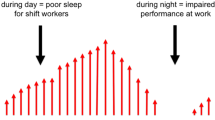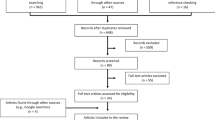Abstract
Purpose
Replication and cross-validation of results on health and safety risks of work at unusual times.
Methods
Data from two independent surveys (European Working Conditions Surveys 2005 and 2010; EU 2005: n = 23,934 and EU 2010: n = 35,187) were used to examine the relative risks of working at unusual times (evenings, Saturdays, and Sundays) on work–life balance, work-related health complaints, and occupational accidents using logistic regression while controlling for potential confounders such as demographics, work load, and shift work.
Results
For the EU 2005 survey, evening work was significantly associated with an increased risk of poor work–life balance (OR 1.69) and work-related health complaints (OR 1.14), Saturday work with poor work–life balance (OR 1.49) and occupational accidents (OR 1.34), and Sunday work with poor work–life balance (OR 1.15) and work-related health complaints (OR 1.17). For EU 2010, evening work was associated with poor work–life balance (OR 1.51) and work-related health complaints (OR 1.12), Saturday work with poor work–life balance (OR 1.60) and occupational accidents (OR 1.19) but a decrease in risk for work-related health complaints (OR 0.86) and Sunday work with work-related health complaints (OR 1.13). Risk estimates in both samples yielded largely similar results with comparable ORs and overlapping confidence intervals.
Conclusions
Work at unusual times constitutes a considerable risk to social participation and health and showed structurally consistent effects over time and across samples.
Similar content being viewed by others
References
Ala-Mursula L, Vahtera J, Pentti J, Kivimäki M (2004) Effect of employee worktime control on health: a prospective cohort study. Occup Environ Med 61:254–261
Ala-Mursula L, Vahtera J, Linna A, Pentti J, Kivimäki M (2005) Employee worktime control moderates the effects of job strain and effort-reward imbalance on sickness absence: the 10-town study. J Epidemiol Community Health 59:851–857
Arendt J (2010) Shift work: coping with the biological clock. Occup Med 60:10–20
Arlinghaus A, Nachreiner F (2012) Arbeit zu unüblichen Zeiten—Arbeit mit unüblichem Risiko (Work at unusual times—work at unusual risks). Z Arb wiss 66:291–305
Arlinghaus A, Lombardi D, Courtney T, Christiani D, Folkard S, Perry M (2012) The effect of rest breaks on time to injury—a study on work-related ladder-fall injuries in the United States. Scand J Work Environ Health 38:560–567
Baer K, Ernst G, Nachreiner F, Schay T (1981) Psychologische Ansätze zur Analyse verschiedener Arbeitszeitsysteme (Psychological approaches to analyze different working time systems). Z Arb wiss 35:136–141
Baer K, Ernst G, Nachreiner F, Volger A (1985) Subjektiv bewertete Nutzbarkeit von Zeit als Hilfsmittel zur Bewertung von Schichtplänen (Subjective utility of time as a means of evaluating shift schedules). Z Arb wiss 39:169–173
Bittman M (2005) Sunday working and family time. Labour Ind 16:59–83
Boisard P, Cartron D, Gollac M, Valeyre A (2003) Time and work: duration of work. Office for Official Publications of the European Communities, Louxembourg
Bonitz D, Grzeck-Sukalo H, Nachreiner F (1987) Differential psychosocial effects of different shift systems. In: Oginsky A, Pokorski J, Rutenfranz J (eds) Contemporary advances in shiftwork research, Theoretical and practical aspects in the late eighties. Med Acad, Krakow, pp 181–189
Brogmus G (2007) Day of the week lost time occupational injury trends in the US by gender and industry and their implications for work scheduling. Ergonomics 50:446–474
Brown K, Bradley L, Lingard H, Townsend K, Ling S (2010) Working time arrangements and recreation: making time for weekends when working long hours. The free library. http://www.thefreelibrary.com/Working+time+arrangements+and+recreation%3A+making+time+for+weekends.-a0237838393. Accessed 22 Dec 2015
Ernst G, Nachreiner F, Volger A (1986) Applicability of shift work research to problems of irregular working hours. In: Haider M, Koller M, Cervinka R (eds) Night and shiftwork: longterm effects and their prevention. Proceedings of the VII international symposium on night- and shiftwork, Igls, Austria, 1985. Lang, Frankfurt, pp 261–268
Folkard S, Åkerstedt T (2004) Trends in the risk of accidents and injuries and their implications for models of fatigue and performance. Aviat Space Environ Med 75:A161–A167
Folkard S, Lombardi D (2004) Designing safer shift systems. In: Nickel P, Hänecke K, Schütte M, Grzech-Sukalo H (eds) Aspekte der arbeitspsychologie in wissenschaft und praxis. Pabst, Lengerich, pp 151–166
Frone M (2000) Work-family conflict and employee psychiatric disorders: the national comorbidity survey. J Appl Psychol 85:888–895
Geurts S, Sonnentag S (2006) Recovery as an explanatory mechanism in the relation between acute stress reactions and chronic health impairment. Scand J Work Environ Health 32:482–492
Giebel O, Wirtz A, Nachreiner F (2008) The interference of flexible working times with the circadian temperature rhythm—a predictor of impairment to health and well-being? Chronobiol Int 25:263–270
Grant-Vallone E, Donaldson S (2001) Consequences of work-family conflict on employee well-being over time. Work Stress 15:214–226
Hammer T, Saksvik P, Nytro K, Torvatn H, Bayazit M (2004) Expanding the psychosocial work environment: workplace norms and work-family conflict as correlates of stress and health. J Occup Health Psychol 9:83–97
Hinnenberg S, Zegger C, Nachreiner F, Horn D (2009) The utility of time—revisited after 25 years. Shiftw Int Newsl 25:52
Hornberger S, Knauth P (1993) Interindividual differences in the subjective valuation of leisure time utility. Ergonomics 36:255–264. doi:10.1080/00140139308967880
Hosmer D, Lemeshow S, Sturdivant R (2013) Applied logistic regression, 3rd edn. Wiley, New York
Jamal M (2004) Burnout, stress and health of employees on non-standard work schedules: a study of Canadian workers. Stress Health 20:113–119
Joyce K, Pabayo R, Critchley J, Bambra C (2010) Flexible working conditions and their effects on employee health and wellbeing. Cochrane Database Syst Rev 2:CD008009
Kümmerling A, Lehndorff S (2007) Extended and unusual working hours in European companies. European Foundation for the Improvement of Living and Working Conditions, Luxembourg
Lombardi D, Jin K, Courtney T, Arlinghaus A, Folkard S, Liang Y, Perry M (2014) The effects of rest breaks, work shift start time, and sleep on the onset of severe injury among workers in the People’s Republic of China. Scand J Work Environ Health 40(2):146–155
Lyonette C, Clark M (2009) Unsocial hours: unsocial families? Working time and family wellbeing. Relationships Foundation, Cambridge
Mustard C, Chambers A, McLeod C, Bielecky A, Smith P (2013) Work injury risk by time of day in two population-based data sources. Occup Environ Med 70:49–56
Nijp H, Beckers D, Geurts S, Tucker P, Kompier M (2012) Systematic review on the association between employee worktime control and work-non-work balance, health and well-being, and job-related outcomes. Scand J Work Environ Health 38:299–313
Parent-Thirion A, Macías FE, Hurley J, Vermeylen G (2007) Fourth European working conditions survey. Publication Office of the European Union, Luxembourg
Parent-Thirion A, Vermylen G, van Houten G, Lyly-Yrjänäinen M, Biletta I, Cabrita J (2012) Fifth European working conditions survey. Publication Office of the European Union, Luxembourg
Podsakoff P, MacKenzie S, Lee J, Podsakoff N (2003) Common method biases in behavioral research: a critical review of the literature and recommended remedies. J Appl Psychol 88:879–903
Sallinen M (2014) Rest breaks—a countermeasure for work-related injuries? Scand J Work Environ Health 30:105–108
Tucker P (2003) The impact of rest breaks upon accident risk, fatigue and performance: a review. Work Stress 17:123–137
Tucker P, Folkard S (2012) Working time, health, and safety: a research synthesis paper. International Labour Office, Geneva
Tucker P, Lombardi D, Smith L, Folkard S (2006) The impact of rest breaks on temporal injury risk. Chronobiol Int 23:1423–1434
Tucker P, Brown M, Dahlgren A, Davies G, Ebden P, Folkard S et al (2010) The impact of junior doctors’ worktime arrangements on their fatigue and well-being. Scand J Work Environ Health 36:458–465
Tucker P, Bejerot E, Kecklund G, Aronsson G, Åkerstedt T (2013) Doctors’ work hours in Sweden: their impact on sleep, health, work-family balance, patient care and thoughts about work. Stressforskningsinstitutet, Stockholm
Wedderburn A (1981) Is there a pattern in the value of time off work? In: Reinberg A, Vieux N, Andlauer P (eds) Night and shift work: biological and social aspects. Advances in the biosciences. Pergamon Press, Oxford, pp 495–504
Wedderburn A (2000) ‘Shiftwork and health’, bulletin of European studies on time (BEST), no. 1. Office for Official Publications of the European Communities, Luxembourg
Williamson A, Lombardi D, Folkard S, Stutts J, Courtney T, Connor J (2011) The link between fatigue and safety. Accid Anal Prev 34:498–515
Wirtz A, Nachreiner F (2010) The effect of extended work hours on health and social well-being—a comparative analysis of four independent samples. Chronobiol Int 27:1124–1134
Wirtz A, Giebel O, Schomann C, Nachreiner F (2008) The interference of flexible working times with the utility of time: a predictor of social impairment? Chronobiol Int 25:249–261
Wirtz A, Nachreiner F, Rolfes K (2011) Working on Sundays—effects on safety, health, and work-life balance. Chronobiol Int 28:361–370
Zhang J, Yu K (1998) What’s the relative risk? A method of correcting the odds ratio in cohort studies of common outcomes. JAMA 280:1690–1691
Author information
Authors and Affiliations
Corresponding author
Ethics declarations
Conflict of interest
The authors declare that they have no conflict of interest.
Rights and permissions
About this article
Cite this article
Greubel, J., Arlinghaus, A., Nachreiner, F. et al. Higher risks when working unusual times? A cross-validation of the effects on safety, health, and work–life balance. Int Arch Occup Environ Health 89, 1205–1214 (2016). https://doi.org/10.1007/s00420-016-1157-z
Received:
Accepted:
Published:
Issue Date:
DOI: https://doi.org/10.1007/s00420-016-1157-z




